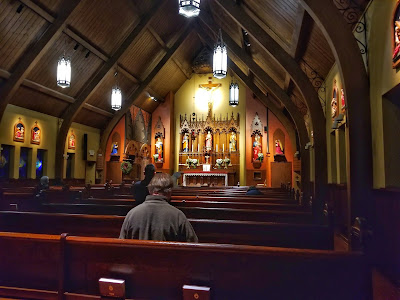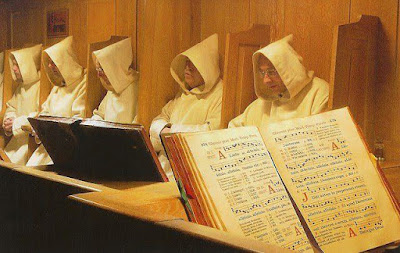You may download a PDF of the Holy Monday, Holy Tuesday, and Spy Wednesday Mass propers in the pre-1955 rubrics by clicking here. Today's stational church is at St. Praxedes.
Vestments: Violet
INTROIT (Ps. 34:1-2)
Fight, O Lord, against those who fight me; war against those who make war upon me. Take Your sword and shield, and rise up to help me, O Lord, the source of my salvation. Ps. 34:3. Bring up Your lance, and block the way against my persecutors; say to my soul, "I am your salvation." Fight. O Lord, against those . . .
COLLECT
Almighty God, may the merits of the passion of Your only-begotten Son give us new strength, for our own weakness brings nothing but failure in the face of so many difficulties; who lives and rules with You . . .
LESSON (Isa. 50:5-10)
In those days, Isaias said, "The Lord God hath opened my ear, and I do not resist: I have not gone back. I have given my body to the strikers, and my cheeks to them that plucked them: I have not turned away my face from them that rebuked me, and spit upon me. The Lord God is my helper, therefore am I not confounded: therefore have I set my face as a most hard rock, and I know that I shall not be confounded. He is near that justifieth me, who will contend with me? let us stand together, who is my adversary? let him come near to me. Behold the Lord God is my helper: who is he that shall condemn me? Lo, they shall all be destroyed as a garment, the moth shall eat them up. Who is there among you that feareth the Lord, that heareth the voice of his servant, that hath walked in darkness, and hath no light? let him hope in the name of the Lord, and lean upon his God."
GRADUAL (Ps. 34:23, 3)
Arise, O Lord, and be watchful in my defense and my cause, my God and my Lord. V. Bring up Your lance and block the way against my persecutors.
TRACT (Ps. 102:10; 78:8-9)
O Lord, repay us not according to the sins we have committed, nor according to our iniquities. V. O Lord, remember not our iniquities of the past; let Your mercy come quickly to us, for we are being brought very low. (Here all kneel.) V. Help us, O God our Saviour, and for the glory of Your name, O Lord, deliver me; and pardon us our sins for Your name's sake.
GOSPEL (John 12:1-9)
Jesus therefore, six days before the pasch, came to Bethania, where Lazarus had been dead, whom Jesus raised to life. And they made him a supper there: and Martha served. But Lazarus was one of them that were at table with him. Mary therefore took a pound of ointment of right spikenard, of great price, and anointed the feet of Jesus and wiped his feet with her hair. And the house was filled with the odour of the ointment.
Then one of his disciples, Judas Iscariot, he that was about to betray him, said: "Why was not this ointment sold for three hundred pence and given to the poor?" Now he said this not because he cared for the poor; but because he was a thief and, having the purse, carried the things that were put therein. Jesus therefore said: "Let her alone, that she may keep it against the day of my burial. For the poor you have always with you: but me you have not always."
A great multitude therefore of the Jews knew that he was there; and they came, not for Jesus' sake only, but that they might see Lazarus, whom he had raised from the dead.
OFFERTORY ANTIPHON (Ps. 142:9-10)
Rescue me from my enemies, o Lord; I flee to You. Teach me to do Your will, for You are my God.
SECRET
O Lord, may these sacred rites we perform cleanse us, so that we may be purified and brought closer to God who is their Founder. Through Our Lord . . .
COMMUNION ANTIPHON (Ps. 34:26)
Let all who rejoice at my misfortune be put to shame and confounded. Let those who speak maliciously of me be clothed with shame and disgrace.
POSTCOMMUNION
O Lord, may Your Sacraments fill us with holy fervor so that we may delight in the celebration and grace of this sacred rite. Through Our Lord . . .
PRAYER OVER THE PEOPLE
Help us, O God of our salvation! Grant that we may come with joy to commemorate Your mercies through which we have been restored to a new life. Through Our Lord...
























